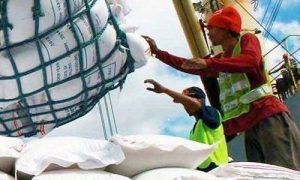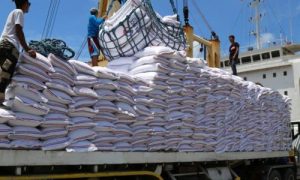Kenya secures Sh30m to boost rice production, slash imports

Kenya plans to cut rice imports by 50% over the next five years through a Sh30 million initiative. Agriculture and Livestock Development CS Andrew Karanja announced that this goal will be achieved by adopting high-yielding rice varieties and modern farming technologies. Currently, Kenya imports 800,000 to 1 million tonnes of rice annually, while local production is only 150,000 to 200,000 tonnes.
Kenya is poised to benefit from a Sh30 million initiative aimed at boosting rice production and reducing imports.
Agriculture and Livestock Development CS Andrew Karanja said the country plans to cut rice imports by 50 per cent within the next five years.
“This goal will be achieved by adopting high-yielding rice varieties and modern farming technologies,” Karanja said.
He said Kenya currently imports between 800,000 and 1 million tonnes of rice annually, while local production ranges from 150,000 to 200,000 tonnes.
“This disparity places a significant financial burden on the government each year as we must allocate substantial resources to bridge the gap,” he added.
Karanja spoke during the opening of the 6th Korea-Africa Food & Agriculture Cooperation Initiative General Assembly in Nairobi.
The assembly aims to review progress, celebrate successes and identify areas for further improvement.
Since its inception, the KAFACI initiative has driven substantial changes across Africa.
“We have seen successful implementations of various projects focused on enhancing agricultural productivity, improving food security and boosting the livelihoods of millions of farmers,” Karanja said.
Currently, KAFACI is supporting four ongoing projects, including enhancing vegetable production in Africa, with a focus on maximising tomatoes and onions yields.
Others are development of high-yielding grain-quality rice varieties using elite lines from Korea and Kenya.
This is in addition to integrated management of fall armyworm to ensure sustainable food security across the continent.
It is also ensuring optimisation of crop-livestock systems in Africa through effective use of nitrogen-fixing legumes and livestock manure.
In addition to these projects, KAFACI provides advanced training and equips the next generation of agricultural researchers with crucial skills and knowledge.
“Our farmers now have the tools and expertise for efficient and sustainable farming practices. This has not only increased yields but also strengthened our economies, ensured food security and created employment opportunities,” Karanja said.
Kenya Agricultural and Livestock Research Organisation director general Dr Eliud Kireger said they are collaborating with the Rural Development Administration under the KAFACI initiative.
The core focus of the collaboration is agricultural mechanisation, particularly in rice production.
Kireger said the demand for rice is increasing, but production levels remain low. This partnership is aimed at boosting rice production in both yield and quality.
“Kenya will benefit from Sh30 million of the total Sh6.4 billion ($50 million) programme which is being rolled out in 37 countries in Africa for five years,” Kireger said.
“This will be centred on germplasm exchange. Essentially, we are sharing high-performing rice varieties and other successful products from different regions,” Kireger said.
“As a result, we have already introduced three new rice varieties. We anticipate a significant increase in productivity over the next five years, which should reduce our rice imports by about 50 per cent.”
He said Kenya will also benefit from advanced technologies developed by Korean partners, especially in rice production mechanisation.
This technological infusion is expected to enhance the mechanisation of rice farms and boost overall production.
“The young generation is increasingly turning to rice instead of traditional foods like ugali, and we expect rice demand to double in the next decade,” Kireger added.
Hwang Yong Kim of the Rural Development Administration, said KAFACI has developed 26 high-yield, high-quality rice varieties over the years.
“These varieties are adapted to various African environments and have achieved varietal registration in eight countries,” he said.
“KAFACI has taken a multifaceted approach to boost agricultural productivity in Africa,” Yong said.
“This includes developing a comprehensive database cataloging the characteristics of various indigenous cattle breeds. It also includes publishing an extensive research and analysis report on the status of agricultural mechanisation across the continent.”
Established in 2010, KAFACI aims to enhance food security and promote sustainable agricultural and rural development in Africa.
The initiative began with 16 African member countries and has since expanded to 23 countries by 2022.
Today, KAFACI welcomes 14 more countries into its partnership.
To read more about the news about the Rice News continue reading Agriinsite.com
Source Link : https://www.the-star.co.ke/news/star-farmer/2024-08-27-kenya-secures-sh30m-to-boost-rice-production-slash-imports/















